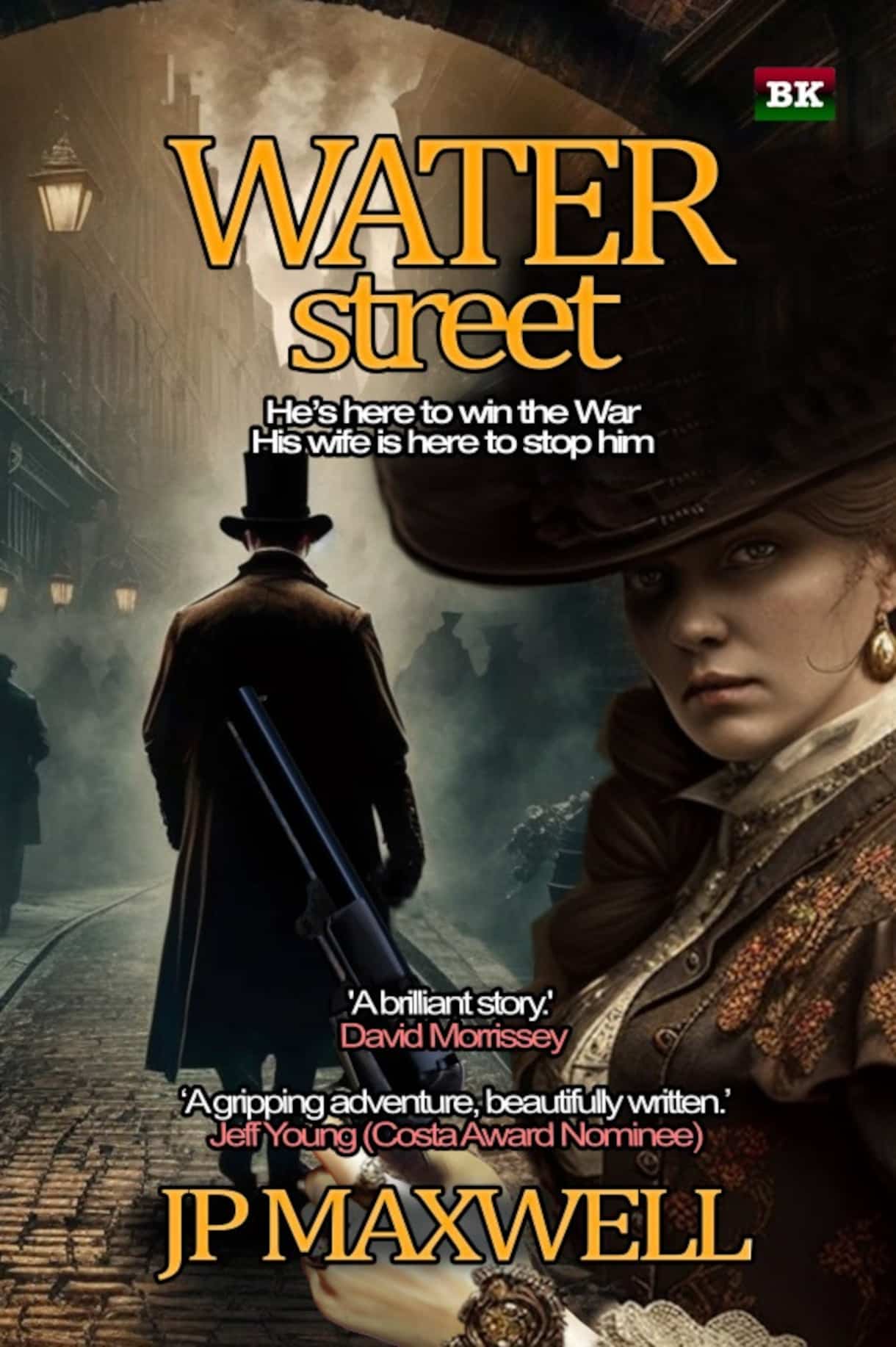The historic port city of Liverpool played a significant and important part in the US Civil War.

Water Street
Liverpool 1863. The American Civil War comes to the British Empire’s second city and the world’s richest port.
Confederate Commander Banastre X. Dunwoody has a plan to turn the conflict by securing advanced warships, but the U.S. Government is one step ahead of him. It seeks to sabotage his efforts through its covert agent – Harriet Dunwoody – Banastre’s pregnant wife.
Alongside her undercover partner Conté, Harriet discovers that Banastre has plans to do more than building ships; he has a scheme that could very well draw Britain into the war.
As Gettysburg looms, an ocean away there’s another battle to be won and lost. The fate of the USA and the City of Liverpool rests upon it.
*
*
Praise for Water Street
A brilliant story – David Morrissey (Actor, Director, Producer – The Walking Dead, Britannia, State of Play)
A gripping adventure, beautifully written – Jeff Young (Costa Award nominee)
A strapping ride through history – Caroline Smailes (Bestselling author – The Drowning of Arthur Braxton)
From the opening lines, Maxwell’s distinct, almost folksy voice gripped me. Reading, I felt as if some old sailor was telling me the story in the smoky, stinking confines of a Liverpool bar – Historical Novel Society
*
Background to the Book
A little known link with Liverpool – beyond the Beatles and the maritime port – was the city’s massive impact on the American Civil War (funding the confederacy). Ironclad warships were financed and built in Liverpool for the Confederate Navy. Even the crews came from the city as janissary sailors, mercenaries for hire.
The CSS Alabama is the most notorious of these ships, smashing through Union vessels before eventually being sunk off Cherbourg in 1864.
Liverpool was teeming with Confederate and Union spies in 1863. James Dunwoody Bulloch, one of the inspirations for Banastre Dunwoody in the book, actively sought out funds from the Liverpool Cotton Exchange to build ships and finance the Confederate War Machine. Bulloch is buried in Smithdown Road Cemetery.
Former slaves and refugees populated areas of the city before, during and after the war, mixing with the predominantly Irish communities in what is now the Baltic Triangle area of the city. Both sides recruited soldiers from the overflowing Irish communities in Liverpool, offering land and a wage as enticements. This links the Irish Hunger, American Civil War and North America in profound ways. With a high proportion of homeless, starving people not long landed in the city (bearing in mind the Irish Famine in the late 1840s), there was no shortage of takers.
The United States Consulate in Liverpool, England, was established in 1790, and was the first overseas consulate founded by the then fledgling United States of America. Liverpool was at the time an important center for transatlantic commerce and a vital trading partner for the former Thirteen Colonies. Among those who served the United States as consul in Liverpool were the writer Nathaniel Hawthorne, the spy Thomas Haines Dudley (incumbent during the American Civil War and a character in the book), and John S. Service, who was driven out of the United States Foreign Service by McCarthyite persecution. After World War II, as Liverpool declined in importance as an international port, the consulate was eventually closed down. [wikipedia]
There were two unofficial Confederate Consulates in Liverpool. The first was at 10 Rumford Place in Castle Street. These were offices that were used by Southern business representatives who worked tirelessly to acquire shipping and good that would help them break the blockade and provide vital supplies for their troops.
The second property was 19 Abercromby Square which was constructed during the war by Charles Prioleau who descended from a well connected French Huguenot family from Charleston, South Carolina. It was claimed that this would become a diplomatic and business base for the Confederate cause. Interestingly, a local newspaper claimed that this would become Jefferson Davis’s European ‘White House’.
Prioleau became a naturalized British citizen at the outbreak of the Civil War, which was a strategic move both politically and financially. As a British citizen, Prioleau’s assets were less likely to be seized by the Federal government. Prioleau used his position to help set up a financial company to help fund the Confederate war machine. He also became the treasurer for the Committee for the Relief of Southern Prisoners and organised clothing to be distributed to Confederate soldiers held by the Union.
*
About the Author
With a background ranging from studying Russian at University College London to working for a Californian Software company and running a newspaper kiosk, JP Maxwell settled back in Liverpool in 2001 and now teaches Screenwriting and Digital Writing at Liverpool John Moores University. Although fictional, his writing directly links to an Irish and African family history in the port city and specifically Toxteth since the early 1800s. In addition to Water Street, based upon Liverpool’s clandestine involvement in the American Civil War, he is writing a spy/crime novel Camper Van Woman based upon his adventures in Eastern Europe and 1980s Toxteth.
*
For readers of The Killer Angels, Andersonville and Cold Mountain comes a spy yarn with Western notes set in Victorian England, the last place you’d expect to see shootouts and the blue uniforms of the US Cavalry.
Between 1847 and 1863, Liverpool’s population exploded as a result of the Irish Famine and it became the lynchpin of international trade, including slavery. Water Street chronicles people who were at the centre of both seismic events – tragic and deliberate – in equal measures.
*
Written by JP Maxwell
Published July 1st 2023 | 228pp | Print: 9781739306236 | Kindle: 9781739306212 | ePub: 9781739306229
When you purchase through links on our site, we may earn an affiliate commission at no addditional cost to you.
*
Book Categories: Fiction.
